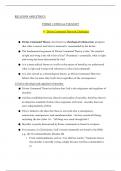RELIGION AND ETHICS
THEME 1: ETHICAL THOUGHT
A. Divine Command Theory & Challenges
● Divine Command Theory, also known as theological voluntarism, proposes
that what is moral, and what is immoral is commanded by the divine
● The fundamental argument of Divine Command Theory is that “the standard
of right and wrong is the will or law of God” (Frankena) - essentially, what is right
and wrong has been determined by God
● It is a meta-ethical theory as it tells us the nature of morality; we understand
what is right and wrong with reference to what God commands
● It is also viewed as a deontological theory, as Divine Command Theorists
believe that we must obey God’s laws regardless of the consequences
1) God as the origin and regulator of morality
● Divine Command Theorists believe that God is the originator and regulator of
morality
● God has established eternal, objective principles of morality, therefore there is
an objective standard of ethics that originates with God – morality does not
exist independently of Him
● This is linked to the idea that there is one God who is omnipotent,
omniscient, omnipresent, and omnibenevolent – He has created all things,
including the law (John 1:3 - “All things were made through him”)
● Morality is purely determined by divine commands as found in scripture
● For instance, in Christianity, God’s moral commands are found in the Bible
e.g., the 10 commandments (Exodus 20)
o From commandments such as “You shall not murder,” humanity knows
that murder is morally wrong, simply because God has commanded it
so
, ● Although the specific content of divine commandments varies according to
the religion and their religious texts, all versions of divine command theory as
upheld in many monotheistic religions (such as Christianity, Judaism, and
Islam) maintain that morality is a response to divine revelation
● Therefore, many religions claim that ethics is not relative to the preferences
of culture, it is absolute
2) Right or wrong as objective truths based on God’s will
● Since all moral obligations depend on God, what is right and wrong become
objective truths based on God’s will
● This is because, as aforementioned, morality is absolute (humanity’s feelings
and views on what should and should not be considered ethical)
● Therefore, Divine Command Theory is not a subjective theory (a theory that is
dependent upon personal views)
o e.g., murder will always be seen as morally wrong because God deems it
to be so, regardless of whether mankind believes that it could be
justified in some circumstances
● God has complete authority, as Jat Robinson states, “They are the
commandments which God gives…certain things are always wrong and nothing can
make them right”
● He identifies the universal, absolutist nature of Divine Command Theory; it
promotes a standard of morality that is binding on all humans and always
right despite the views of society
3) Moral goodness is achieved by complying with divine command
● The only way to be moral is to follow God’s commands
● For example, in Islam, the Qur’an states, “Do not come near to adultery, it is a
shameful act” (Surah Al-Israh 17:32). Moral goodness can only be achieved by
not committing adultery
● This idea that obedience to scripture equates to moral behaviour is also
strongly supported in Christianity, as Deuteronomy 13:18 states, “The Lord
your God will be merciful if you keep to all his commands”




